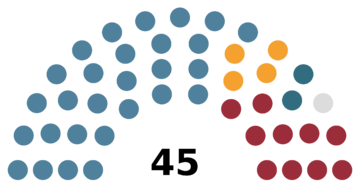Mava Council
Assembly of the Republic of Mava Áwnuhiu’akak á’at Naigál'yaké 'a Máva | |
|---|---|
| 50th Assembly of Mava | |
 | |
| Type | |
| Type | |
| History | |
| Founded | 1 April 1925 |
| Preceded by | Legislative Council of Mava |
| Leadership | |
President | Nua Kiuiáké, Independent[a] since 11 January 2023 |
Deputy President | Ámikat Uuyukluq, Labour Movement since 11 January 2023 |
| Structure | |
| Seats | 45 |
 | |
Political groups | Government (28)
Opposition (17)
|
Length of term | 2 years |
| Elections | |
| First-past-the-post | |
First election | 7 May 1925 |
Last election | 11 May 2023 |
| Meeting place | |
 | |
| Akitat'áwnuhiu’akak | |
| Website | |
| www.awnuhiuakak.mv | |
| Constitution | |
| Constitution of Mava | |
| Footnotes | |
| |
 |
|---|
| This article is part of a series on the politics and government of Mava |
|
The Assembly of the Republic of Mava (Mavean: Áwnuhiu’akak á’at Naigál'yaké 'a Máva) is the democratically-elected legislature of Mava. Located in Pa'as, it comprises 45 members known as "Assemblymen/Assemblywomen" (Mavean: Áwnuhiu’akak'ag/Áwnuhiu’akak'ig), who are elected to represent individual geographical constituencies by the plurality system. In accordance with the Constitution, all executive and legislative power is vested in the Assembly as the supreme representation of the Mavean people. The most recent election to the Assembly was held on 11 May 2023, with the Progressive Party of the Mavean Islands winning an outright majority.
The Assembly is a unicameral body responsible for creating and amending all laws in Mava. It was founded in 1925 through the interim Mavean Independence Act and was permanently established in the 1925 Mavean Constitution. Between 1925 and 1994, the Assembly was de facto bicameral, with a "Grand Committee of the Assembly" acting as a technocratic review body within the assembly. The committee was abolished by the Assembly Act (Members and Voting) Act 1993.
Powers and role
Under the constitution, there is no legal or constitutional separation between the executive and legislative branches. The government is officially called the "Executive Committee of the Assembly" and derives its powers from the Assembly. In practice, there is a separation of functions, although officially the government and assembly constitute one single corporation governed by the constitution and relevant laws.
The Assembly's powers are established in the Constitution of Mava, which establishes it as the supreme representative body of the people of the Republic of Mava. It is convened in two sessions each year, the first session on the second Monday of January and the second session on the second Monday of September. Extraordinary sessions may be called by the President, the Prime Minister or by one-fifth of members.
The Assembly is responsible for adopting laws, approving the state budget, appointing the President and members of the government, declaring war and peace, ratifying and denouncing international treaties, and generally overseeing the government and holding it to account. The Assembly also introduces amendments to the Constitution of Mava. Bills presented to the Assembly require the signatures of at least five members, and any member may propose a bill.
The presiding officer of the Assembly is the President, who is elected by its members. The president, in recognition of the executive role of the Assembly, also concurrently serves as President of the Republic and head of state. They are required to be a member of the Assembly and serve a term concurrent with that of the wider membership. During the election of the president, the longest-serving member acts as presiding officer. In the president's absence, the Assembly elects a deputy president.
Elections
Constituencies
45 members are returned from single-member constituencies. Each district is divided into a number of seats based on their population. The allocation of constituencies is reviewed every ten years by the Mavean Elections Office.
| District | Seats |
|---|---|
| Ásqaalet | 4 |
| Mélep | 8 |
| Pa'as | 14 |
| Pmák | 8 |
| Sigák | 5 |
| Sittiyá | 2 |
| Tágokiajut | 3 |
| Owurah'maké and Tokuk'maké | 1 |
The current set of constituency boundaries came into effect ahead of the May 2015 assembly elections. Prior to this, Pa'as had 16 seats, which were re-allocated to Ásqaalet and Pmák.
2023 election
See also
- Politics of Mava
- Culture of Mava
Notes
External links
- Assembly of Mava. awnuhiuakak.mv
